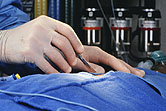Very low rate for patients undergoing posterior transtubular microscopic assisted spinal surgery
WEDNESDAY, Feb. 11, 2015 (HealthDay News) — For patients undergoing posterior transtubular microscopic assisted spinal surgery, the postoperative infection rate is very low, according to a study published in the Feb. 1 issue of Spine.
Mootaz Shousha, M.D., from the Zentralklinik Bad Berka in Germany, and colleagues examined the rate of postoperative infection associated with minimally invasive noninstrumented spinal surgery. Data were included for 4,037 patients undergoing 4,350 posterior spinal surgery procedures using a tubular retractor system with the aid of operative microscope between June 1998 and November 2013. Overall, 98.4 percent of procedures were performed in the lumbar spine and in 96.9 percent of cases the indication was degenerative in nature.
The researchers found that four patients experienced postoperative infection (0.09 percent); all of which occurred in the lumbar region after discectomy. The patients presented with discitis and underwent revision (open debridement and fusion). There was a 56-day time lapse between the index surgery and revision. During a mean follow-up of 7.5 years, all patients recovered.
“This minimally invasive technique reduces markedly the risk of postoperative infection when compared with other large series published in the literature,” the authors write.
Relevant financial activities outside the submitted work were disclosed: consultancy, patents, royalties.
Full Text (subscription or payment may be required)
Copyright © 2015 HealthDay. All rights reserved.








